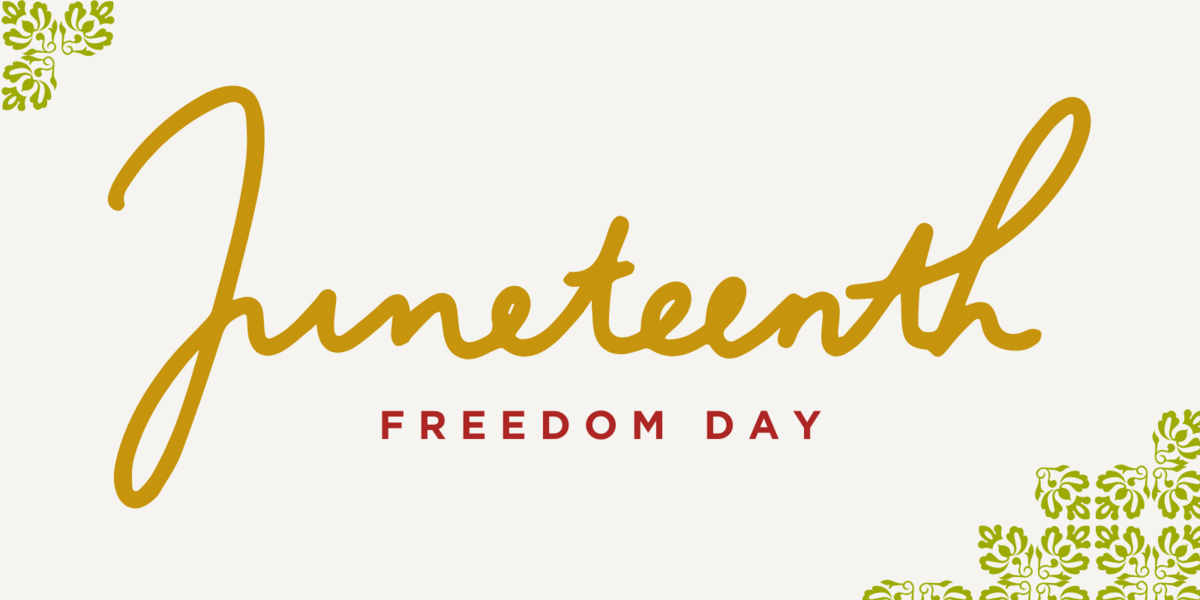Each year on June 19, communities across the country celebrate Juneteenth, the day in 1865 when the last group of enslaved Black Americans in Galveston, Texas, were informed of their freedom — more than two years after the Emancipation Proclamation had been signed. Juneteenth — which became a federal holiday in June 2021 — marks the formal end of slavery in the United States, but it also symbolizes something much deeper: the long and unfinished road toward justice, dignity and healing.
For many Black Americans, Juneteenth is a day of remembrance, resilience and celebration. But it’s important to understand that Juneteenth is not only a Black holiday — it's an American holiday. It tells a critical story about who we are as a nation: the struggle for freedom, the cost of delay, the power of community and the ongoing journey toward equity. For all of us, Juneteenth offers a powerful opportunity to reflect, learn and participate in the shared work of healing and justice.
Freedom Was Not Instant, and It Still Isn’t Equal
While slavery officially ended in 1863, freedom was withheld — first by law, then by custom and even today by systems that continue to disadvantage Black communities, symbolizing how justice is often delayed or denied. For everyone, this is a moment to ask: What does freedom mean in practice — not just on paper? What role can I play in promoting equal access to safety, education, healthcare and dignity?
History Shapes Mental Health Today
Though slavery ended generations ago, its psychological and emotional effects are still present. Researchers and clinicians recognize something called historical trauma — the idea that communities who have faced systemic harm (like slavery, segregation, and racial violence) may continue to experience the effects of that harm across generations (Henderson, Stephens, Ortega-Williams, 2021).
This trauma isn’t about being “stuck in the past.” It’s about living in a present where structural racism, discrimination, and inequality still exist. The stress of navigating this reality — often called racial battle fatigue and/or racial trauma — can affect physical health, emotional well-being and mental health access (Wilson et al., 2024; Winters, 2020). Juneteenth is a time to honor not just the freedom gained, but also the healing still needed — and that’s a responsibility all of us share.
Juneteenth Holds Both Grief and Joy
Juneteenth is often marked by music, food, parades, family gatherings and cultural pride. But it's also a day of deep remembrance — for the lives lost, the justice delayed and the trauma carried emotionally and physically. This mix of joy and grief isn’t contradictory — it’s deeply human. As mental health practitioners, we often say, “Two things can be true at the same time.” We can celebrate the progress achieved since 1865 while also acknowledging pain that persists. We can enjoy the day while committing to the work ahead. Juneteenth is an invitation for all of us to make room for complexity, in ourselves and others.
Healing Happens in Community, Not Isolation
bell hooks wrote, “Rarely, if ever, are any of us healed in isolation. Healing is an act of communion.” In this vein, healing has always been facilitated through church, family, tradition, art, storytelling and protest. These aren’t just cultural expressions — they’re also powerful sources of resilience and mental health.
Juneteenth Is an Opportunity for Reflection
Juneteenth isn’t just about Black history and it’s not only a celebration for Black Americans. It’s an invitation for all to consider what freedom really looks like — and who still feels excluded from it. For all of us, Juneteenth is a moment to ask:
- What do I know (or not know) about this American history?
- How does racial injustice show up in the systems I’m part of — schools, workplaces, communities?
- How can I use my voice, resources or influence to support a more just and healthy society?
Juneteenth is about the fight for freedom — delayed, demanded and deserved. It’s about the responsibility we all share to honor that legacy with action. Juneteenth isn’t a day to be silent or to sit out. It’s a day to show up in humility, solidarity and hope. Freedom is not just a Black issue or a Black achievement. It’s an American value — and when any one group’s freedom is delayed, all of us are called to respond.
How to Get Involved
It’s easy to post a quote or a hashtag on Juneteenth, but real solidarity requires deeper, lifelong practice: attending events, reading Black-authored histories, uplifting/investing in Black-owned businesses, advocating for anti-racist policies, calling out injustice and doing the inner work of unlearning White supremacy. Here are some ideas for celebrating Juneteenth as well as supporting the effort towards Black liberation:
- Best Black-Owned Bookstores in Chicago 2025
- Bronzeville’s 2025 Juneteenth Celebration: Honoring the Legacy of Freedom
- City of Chicago Official Juneteenth Celebration
- From Bronzeville to The Burbs: Juneteenth Chicagoland’s Intersection of Celebration and Calls for Justice
- Where to find Juneteenth celebrations near you in the Chicago area
- Donate/get involved with LIVE FREE Illinois
Henderson, Z. R., Stephens, T. N., Ortega-Williams, A., & Walton, Q. L. (2021). Conceptualizing healing through the African American experience of historical trauma. American Journal of Orthopsychiatry, 91(6), 763.
Wilson, B. L., Nwachuku, B. J., Moore, S. E., Jones, C. A., Laing, B. Y., Boamah, D., ... & Miller, S. (2024). For Crying Out Loud: Racial Battle Fatigue and Black America: Implications for the Counseling Professions. Journal of Progressive Human Services, 1-16.
Winters, M. F. (2020). Black Fatigue: How Racism Erodes the Mind, Body, and Spirit. Berrett-Koehler Publishers.

